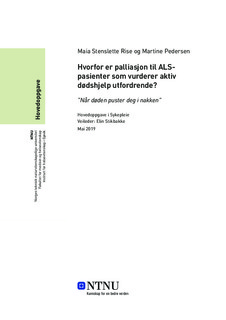Hvorfor er palliasjon til ALS-pasienter som vurderer aktiv dødshjelp utfordrende?
Bachelor thesis
Permanent lenke
http://hdl.handle.net/11250/2613331Utgivelsesdato
2019Metadata
Vis full innførselSamlinger
Sammendrag
Introduksjon:Debatten om palliasjon og aktiv dødshjelp er fremtredende i media. Denne bacheloroppgaven tar for seg palliasjon til ALS-pasienter, og belyser utfordringer knyttet til livsforlengende behandling. Aktiv dødshjelp blir her et sentralt tema.
Hensikt: Formålet med oppgaven er å undersøke om palliasjonstilbudet imøtekommer ALS-pasienters behov. Oppgaven skal videre utforske om kvaliteten på palliativ omsorg har en sammenheng med at noen ALS-pasienter etterspør aktiv dødshjelp. Her vil det fra ulike perspektiv trekkes frem enkelte faktorer som påvirker deres valg.
Metode: Oppgaven er et litteraturstudie, hvor det systematiseres kunnskap fra flere skriftlige kilder og anvendelse av dette vil besvare valgt problemstilling. Relevante artikkelsøk ble utført i anerkjente databaser, og innholdet lest med kildekritisk blikk. Anvendte både kvalitative og kvantitative vitenskapsartikler og annen tilleggslitteratur, som er aktuelle for tematikken.
Resulatat: Ulike funn i de vitenskapelige artiklene tar for seg forskjellige perspektiv i varierende situasjoner, forskjellige land og med ulike holdninger. Noen mener palliasjon er tilstrekkelig, derimot vil andre fremdeles oppsøke kyndig hjelp til å avslutte livet. I Norge er aktiv dødshjelp forbudt, mens noen land har legalisert dette.
Konklusjon: Det er mange faktorer som spiller en sentral rolle rundt tanker om palliasjon til ALS-pasienter og aktiv dødshjelp. Det finnes både for- og motargumenter for dødshjelp og palliasjon til pasienter med uhelbredelig sykdom. Introduction: Debate about palliative treatment and active euthanasia is prominent in the media. This bachelor's thesis will focus on palliative care to ALS-patients, and sheds light on challenges toward life-related treatment. Active euthanasia will be a central theme.
Purpose: Purpose of the task is to investigate whether palliative care meets the needs of ALS patients. The task will further explore if the quality on the palliative care is related to some ALS-patients request about active euthanasia. Some factors that affect their choices, from various perspectives, will be drawn.
Method: The thesis is a literature study, where knowledge is systematized from several written sources and uses this to answer the chosen issue. Relevant article searches were performed in reputable databases, and the content was read with source-critical look. Used both qualitative and quantitative scientific articles and other additional literature that are relevant to the theme.
Results: There are various findings in the scientific articles that deal with different perspectives in different situations, different countries and with different attitudes. Some believe palliation is sufficient, but others will still seek expert help to end their lives. Active euthanasia is legalized in some countries, but is still prohibited in Norway.
Conclusion:. There are many factors that play a central role about palliation for ALS patients and active euthanasia There are both pre- and counter arguments for euthanasia and palliative care for patients with incurable disease.
